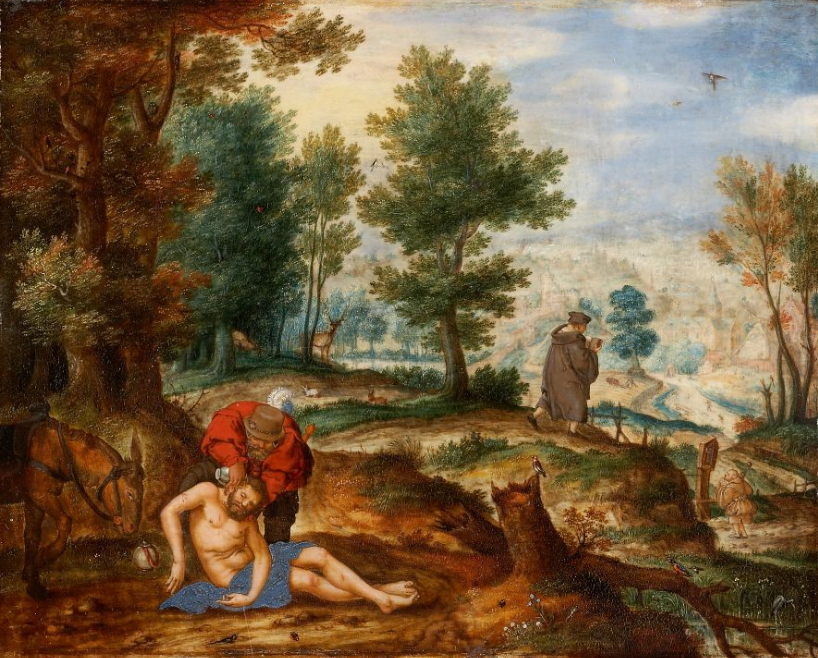Tucked in the middle of His Sermon on the Mount, Jesus directed his disciples' attention to a key lesson of his entire earthly ministry: the need to love one's emenies and pray for one's persecutors, to be perfect as our Father in heaven is perfect.
In the fifth chapter of his Gospel, Matthew captures Jesus' words: "You have heard that it was said, ‘You shall love your neighbor and hate your enemy.’ But I say to you, love your enemies, and pray for those who persecute you, so that you may be sons of your Father who is in heaven; for he makes his sun rise on the evil and the on good, and sends rain on the just and on the unjust. For if you love those who love you, what reward have you? Do not even tax collectors do the same? And if you salute only your brethren, what more are you doing than others? Do not even the Gentiles do the same? You, therefore, must be perfect, as your heavenly Father is perfect." (Matt. 5:43-48)
The word 'perfect' is used exactly twice in all of Scripture, both in Matthew's Gospel. In Matthew 19:21, Jesus tells the rich young man that to be 'perfect' is to find true treasure in heaven. In his case, Jesus told him to "go, sell what you have and give to [the] poor, and you will have treasure in heaven. Then come, follow me.” A tall order for a rich young man. I have frequently pondered what happened that fellow. We never hear the outcome. I hope he got it.
A perfectionist since childhood, I can identify with the challenge that the rich young man faced in Jesus' summons. Perfectionism is defined as "a personal standard, attitude, or philosophy that demands perfection and rejects anything less." It is self-centered behavior of an individual who perceives the need to prove himself in every situation. A good counselor and an number of patient confessors have aided me many times over in my quest to overcome perfectionism and learn the way of humility and grace to which Jesus calls us all.
There are degrees of perfectionism, but the end result is the same in all: the turning of one's focus inward, the antithesis of everything that Jesus taught. Perfectionism is most certainly NOT what Jesus mean in His invitation to be perfect as our Heavenly Father is perfect.
The image of the Good Samaritan comes to mind. While we don't know that the Priest and the Levite who passed by the man beaten and left for dead were perfectionistic, they still demonstrated a lack of compassion, perhaps not even noticing the poor man on the side of the road. The Samaritan, himself despised by the Jews of the time, singularly acted with the love and charity that Jesus described in the invitation to "be perfect as your Heavenly Father is perfect." Clearly, he was living a life for others and not for himself.
the Levite who passed by the man beaten and left for dead were perfectionistic, they still demonstrated a lack of compassion, perhaps not even noticing the poor man on the side of the road. The Samaritan, himself despised by the Jews of the time, singularly acted with the love and charity that Jesus described in the invitation to "be perfect as your Heavenly Father is perfect." Clearly, he was living a life for others and not for himself.
The Greek word used by Matthew in his Gospel is teleios. The word defines its subject as being "complete," or "whole," or "fully grown. The final version, perhaps. Other synonyms for "perfect" suggested to me over time by confessors as I struggled with that word "perfect" in Jesus' call to perfection include "holy," and "merciful." Be "merciful" as your Heavenly Father is "merciful" (and He surely is!!)
Through the Sacraments, our Catholic faith instills hope for those who struggle with aspects of human nature like perfectionism. I know this as surely as I know 1 + 1 = 2. Hope becomes palpable in the Sacrament of Reconciliation, and we taste it in the Sacrament of the Eucharist.
If you would like to understand more about being perfect as our Heavenly Father is perfect, here is a great resource from Catholic Answers: Be Perfect | Catholic Answers Magazine.
Don't give up the pursuit of holiness (perfection.) And don't allow perfectionism to clutter your path.
"Landscape with the Good Samaritan," (ca. 1595-1600, by Pieter Stevens). It hangs in the Städel Museum in Frankfurt, Germany.



